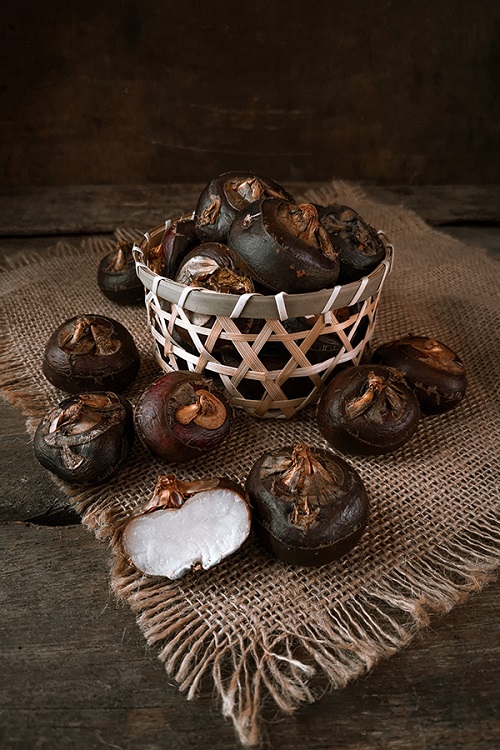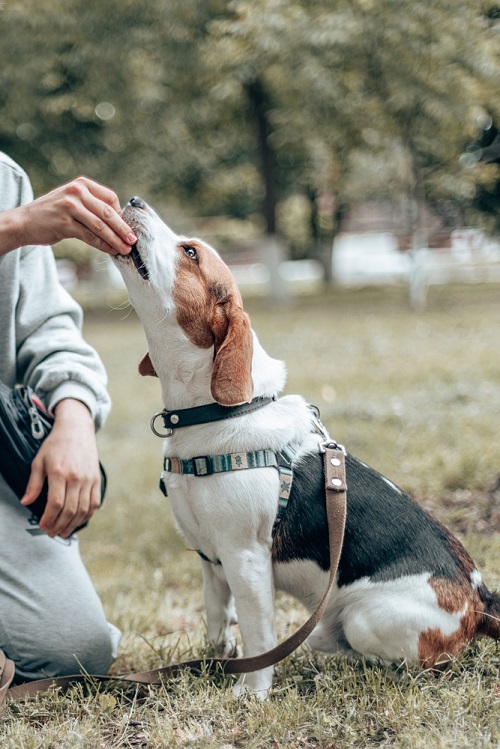Can Dogs Eat Water Chestnuts? Can they be a good option for an occasional treat or a daily food? Let’s find out!
Can Dogs Eat Water Chestnuts? If you are not sure about the answer but want to feed them to your pooch, then keep on reading!
What are Water Chestnuts?

Water chestnuts are aquatic vegetables that are native to Asia and commonly used in Asian cuisine. They grow in marshes, ponds, and shallow lakes and are characterized by their crunchy texture and slightly sweet taste.
Despite their name, water chestnuts are not nuts but rather the corms or underground stems of a type of aquatic plant called Eleocharis dulcis. They are often consumed raw or cooked and can be used in a variety of dishes, such as stir-fries, salads, and soups.
Can Dogs Eat Water Chestnuts?
So, Can Dogs Eat Water Chestnuts? Water chestnuts are not toxic to dogs, and feeding them in small amounts is generally safe. It is best to offer water chestnuts to your furry friend as an occasional treat and in moderation.
Read here about Can Dogs Eat Cheesecake | Are Cheesecakes Good for Dogs?
Are Water Chestnuts Safe For Dogs
Water chestnuts are generally safe for dogs to eat in small amounts. They are not toxic to dogs and do not pose any significant health risks when fed in moderation.
Health Benefits of Water Chestnuts

While water chestnuts may be safe for dogs to eat in small amounts, they do not provide any significant health benefits to your furry friend. Although they are low in calories and high in fiber, they do not offer essential nutrients that dogs need to thrive, such as protein, vitamins, or minerals.
However, some dog owners may choose to feed water chestnuts to their pets as a crunchy and tasty treat, and that’s perfectly fine as long as it is done in moderation. Keep in mind that water chestnuts should not replace a balanced and nutritionally complete diet for your dog.
A Few Health Concerns
- Digestive upset: Water chestnuts are high in fiber, which can cause digestive upset such as bloating, gas, or diarrhea in dogs, particularly if fed in large amounts.
- Choking hazard: Water chestnuts are crunchy and hard, which may pose a choking hazard for dogs, especially small breeds or those who tend to swallow food without chewing it properly. Make sure to cut the water chestnuts into small pieces or grate them before feeding them to your dog.
- Allergic reactions: Although uncommon, some dogs may be allergic to water chestnuts, which can cause symptoms such as itching, hives, or swelling. If you notice any signs of an allergic reaction in your dog after feeding them water chestnuts, stop feeding them immediately and contact your veterinarian.
- Nutritional imbalance: While water chestnuts are low in calories and high in fiber, they do not provide essential nutrients that dogs need, such as protein, vitamins, or minerals.
Read here about Can Dogs Eat Grapes Jelly | Is Grape Jelly Safe for Dogs
How Can I Safely Give Water Chestnuts To My Dog?

- Introduce them slowly: Introduce water chestnuts to your dog’s diet gradually and in small amounts to ensure that they tolerate them well. Start with a small piece and observe your dog’s reaction for any signs of digestive upset or allergic reactions.
- Cut them into small pieces: Water chestnuts are crunchy and hard, which may pose a choking hazard for dogs, particularly small breeds or those who tend to swallow food without chewing it properly. Cut the water chestnuts into small pieces or grate them before feeding them to your dog.
- Wash thoroughly: Rinse the water chestnuts thoroughly under running water to remove any dirt or debris that may be present.
- Feed in moderation: Water chestnuts are not nutritionally complete and do not provide essential nutrients that dogs need, such as protein, vitamins, or minerals. Therefore, it is best to feed them as an occasional treat and in moderation.
- Watch for any adverse reactions: After feeding water chestnuts to your dog, monitor them for any signs of digestive upset or allergic reactions, such as vomiting, diarrhea, or itching. If you notice any unusual symptoms, stop feeding them water chestnuts and contact your veterinarian.
What Happens If Your Dog Eats Too Many Water Chestnuts?
If your dog eats too many water chestnuts or shows any signs of digestive upset or discomfort, it’s best to withhold food for a few hours and offer small amounts of water to prevent dehydration. If the symptoms persist or worsen, or if you notice any other unusual symptoms, such as vomiting or lethargy, contact your veterinarian immediately.
Read here about Can Dogs Eat Chestnuts | Are Chestnuts Safe For Dogs?
A Dog-Safe Water Chestnuts Recipe
Here’s a simple recipe for a dog-safe water chestnut treat:
Ingredients:
- 1 cup of water chestnuts, chopped or grated
- 1 egg
- 1/2 cup of whole wheat flour
Instructions:
- Preheat your oven to 350°F (180°C).
- In a mixing bowl, beat the egg and then add the chopped or grated water chestnuts.
- Mix well and then gradually add the whole wheat flour, stirring until it forms a thick batter.
- Drop spoonfuls of the batter onto a baking sheet lined with parchment paper.
- Bake for 15-20 minutes or until golden brown.
- Allow the treats to cool completely before serving your dog.
- This recipe yields about 12-15 small treats. Remember to feed these treats in moderation and as an occasional snack.
Quick Takeaways
So, Can Dogs Eat Water Chestnuts? In summary, water chestnuts are safe for dogs to eat and can provide health benefits when consumed in moderation.
